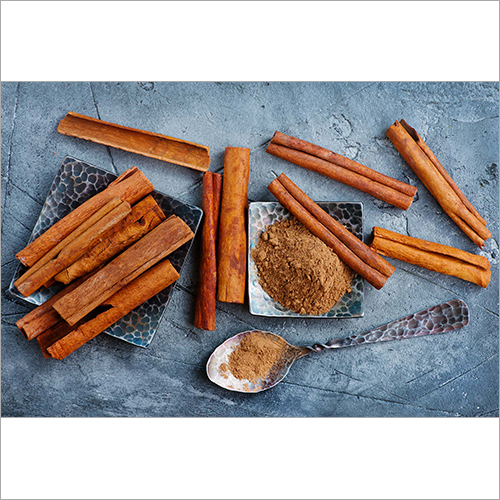Product Description
With valuable assistance of our adept personnel, our reputed enterprise is successfully engrossed in bringing forth a stock of fresh Cinnamon to the precious clients. Owing to its tremendous medicinal properties, it is beneficial in reducing high blood pressure level and can also be utilized as a 100% natural sanitizer to the hands. Plus, it is effective for taking care of the hair growth problems. As a flavoring agent, it is added to a variety of foods in homes, restaurants, banquet halls and many other eateries. It can be used in both power form and bark form. In addition, our offered cinnamon is free from adulterants, and can be bought in varied safe packaging options at market justified prices.
Health benefits of cinnamon:
Cinnamon is a popular spice derived from the bark of Cinnamomum trees and has been used for centuries for its flavor and potential health benefits. While these benefits are not a substitute for medical advice, here are some potential health benefits associated with cinnamon:
1. Antioxidant Properties: Cinnamon is rich in antioxidants, which help protect the body from oxidative stress and reduce the damage caused by free radicals. Antioxidants contribute to overall health and may lower the risk of chronic diseases.
2. Anti-Inflammatory Effects: Some compounds in cinnamon, such as cinnamaldehyde, have anti-inflammatory properties. Chronic inflammation is linked to various health issues, including heart disease and certain cancers, so consuming cinnamon may help mitigate inflammation.
3. Blood Sugar Regulation: Cinnamon has been studied for its potential to improve insulin sensitivity and lower blood sugar levels. It may help people with type 2 diabetes by enhancing insulin function and reducing blood sugar spikes after meals.
4. Heart Health: Cinnamon may have a positive impact on heart health by improving blood lipid profiles. It may help lower total cholesterol, LDL (bad) cholesterol, and triglycerides, thereby reducing the risk of heart disease.
5. Brain Health: Some research suggests that cinnamon might have neuroprotective effects and could potentially contribute to improved cognitive function and memory.
6. Anti-Microbial Properties: Cinnamon contains compounds that have been shown to have antimicrobial effects, which may help combat bacterial and fungal infections. It has been used traditionally to preserve food due to its natural antimicrobial properties.
7. Digestive Health: Cinnamon may aid in digestion by reducing bloating, gas, and indigestion. It may also help promote healthy gut bacteria.
8. Potential Cancer Prevention: Some studies suggest that cinnamon extracts may have anti-cancer properties and could inhibit the growth of cancer cells. However, more research is needed to fully understand its effects in this area.
9. Weight Management: Cinnamon may play a role in supporting weight loss or weight management by helping to control appetite, stabilize blood sugar levels, and improve metabolism.
FAQ:
1. What is cinnamon?
Ans: Cinnamon is a spice obtained from the inner bark of trees belonging to the Cinnamomum family. It is commonly used as a flavoring agent in cooking and baking and is also used for its potential health benefits.
2. What are the different types of cinnamon?
Ans: There are several types of cinnamon, but the two most commonly used are Cassia cinnamon (Cinnamomum cassia) and Ceylon cinnamon (Cinnamomum verum or "true cinnamon"). Cassia cinnamon is more widely available and is the type often found in most grocery stores. Ceylon cinnamon is considered to be of higher quality and is preferred for its milder flavor and lower coumarin content.
3. How is cinnamon used?
Ans: Cinnamon can be used in various forms, including ground cinnamon, cinnamon sticks, and cinnamon oil. It is used as a flavoring agent in both sweet and savory dishes, beverages, and desserts. Cinnamon sticks are often used to infuse flavor into liquids, and ground cinnamon is added directly to recipes.
4. What gives cinnamon its flavor and aroma?
Ans: Cinnamon's characteristic flavor and aroma come from its essential oil, primarily cinnamaldehyde. This compound is responsible for the distinctive spicy and sweet notes of cinnamon.
5. What are the potential health benefits of cinnamon?
Ans: Cinnamon has been associated with antioxidant, anti-inflammatory, blood sugar regulation, heart health, brain health, antimicrobial, digestive health, and potential cancer prevention benefits. However, these potential benefits may vary based on individual factors and should not replace medical advice.
6. Can cinnamon help with diabetes management?
Ans: Some studies suggest that cinnamon may help improve insulin sensitivity and lower blood sugar levels, which could be beneficial for people with type 2 diabetes. However, it's important to work with a healthcare professional to manage diabetes effectively.
7. How much cinnamon should I consume?
Ans: There is no standard recommended dose of cinnamon for its potential health benefits. However, most studies use doses ranging from half a teaspoon to two teaspoons of ground cinnamon per day. It's important not to consume excessive amounts, as high doses of certain types of cinnamon can be harmful.
8. Are there any side effects of consuming cinnamon?
Ans: Cinnamon is generally safe when used in moderate culinary amounts. However, consuming large amounts of cassia cinnamon, which contains higher levels of coumarin, could potentially lead to health issues. Some people may also be allergic to cinnamon or experience digestive discomfort.
9. Can pregnant or breastfeeding women consume cinnamon?
Ans: Cinnamon is generally considered safe in food amounts during pregnancy and breastfeeding. However, it's a good idea to consult a healthcare professional before making any significant dietary changes.
10. Can I take cinnamon supplements?
Ans: Cinnamon supplements are available in various forms, such as capsules or extracts. If you're considering cinnamon supplements for health benefits, it's advisable to consult a healthcare provider before starting any new dietary supplement regimen.
